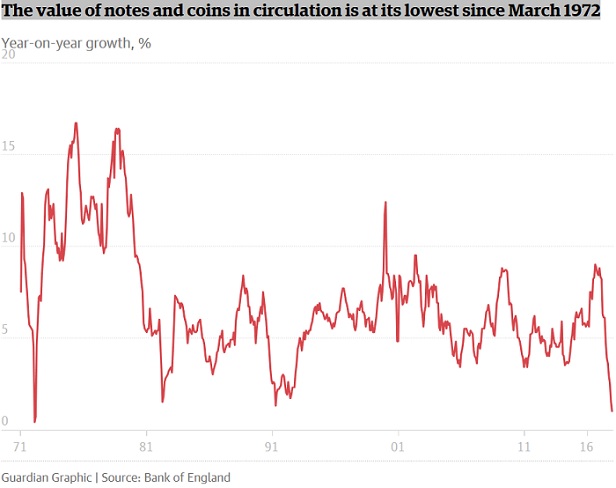Bank of England: the volume of cash in the economy is increasing at its lowest annualy rate since March 1972

Britain will move beyond “peak cash” this year, according to data gathered by the Guardian that suggests notes and coins are rapidly being supplanted as the favoured payment method, particularly in cities. Debit cards are set to overtake cash as the most frequently used payment method in the UK later this year, according to UK Finance, which represents leading finance and banking firms.
The volume of cash removed from cash machines (ATMs) is falling fast, while other data shows customers are eschewing cash for cards – even for small purchases such as a coffee or a beer. In 2006, 62% of all payments in the UK were made using cash; in 2016 the proportion had fallen to 40%. By 2026, it is predicted cash will be used for just 21%, according to figures from UK Finance.
ATM data show that in 2016, there were 2.7bn withdrawals from the country’s 70,000 cash machines – the lowest number of transactions since 2010. The total amount of money withdrawn at ATMs has fallen steeply in the last few years; in 2016, people withdrew more than £6bn less than they did in 2015.
Bank of England figures meanwhile show that while the volume of cash in the economy typically increases every year, it is now doing so at the slowest rate since 1972.
In the UK, even at cafes and pubs, where people buy smaller value items, card payments are taking over. Cash has also declined dramatically for transport payments. In 2017, train ticket payments were more than four times higher by card than by cash, according to data shared by the Rail Delivery Group, which represents train operators in the UK.
Graham Mott, head of strategy at Link, the UK’s largest cash machine network, said that the number of cash machines in Britain was likely to fall, principally in urban centres.
However, some working in cash-handling businesses are confident that a future remains for cash. They point to the fact there are more bank notes in circulation, totalling a higher value, than ever before – though this measure includes cash lying dormant in bank vaults and ATMs, and as such is not a reflection of usage rates.
Mark Trevor, commercial director at Vaultex, which handles one-third of the country’s cash, said while they could not provide figures, they are seeing less of a decline in cash use than other sources are reporting. “While industry figures do show a decline in cash use, the idea that we will all be going cashless has been greatly exaggerated.”
Source: The Quardian
Dariusz Mazurkiewicz – CEO at BLIK Polish Payment Standard
Banking 4.0 – „how was the experience for you”
„To be honest I think that Sinaia, your conference, is much better then Davos.”
Many more interesting quotes in the video below:











